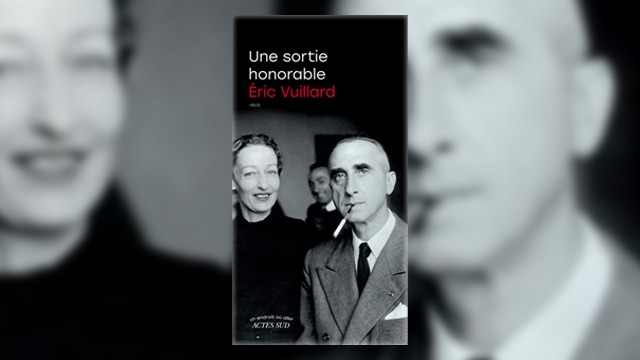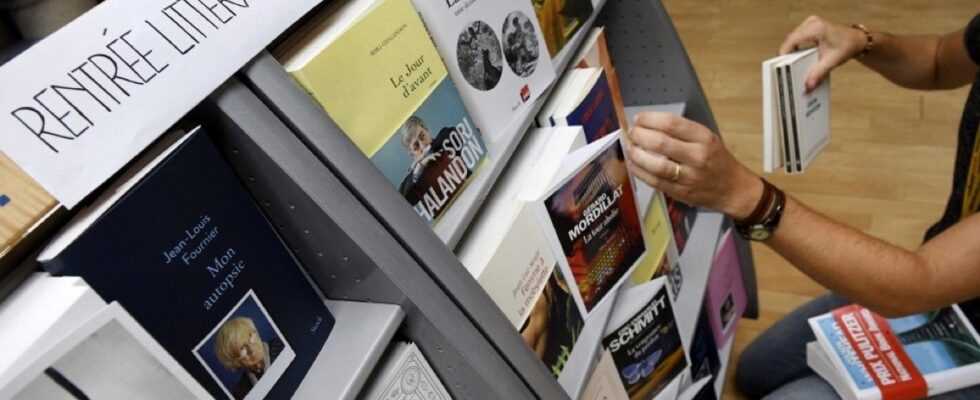Among the some 500 novels to be published between January and February 2022, some particularly caught our attention. From Michel Houellebecq, to Eric Vuillard, including Karine Tuil, here are our favorites from this literary winter season.
“Annihilate”, by Michel Houellebecq
© Flammarion
Three years after “Sérotonin”, the writer Michel Houellebecq is back with “annéantir” (ed. Flammarion). Ambitious, realistic, and tender, it depicts the evils of our society and tackles a wide range of subjects, such as computer terrorism, politics, the end of life, faith, or even love. His eighth book plunges the reader into 2027, in the middle of the presidential campaign. Throughout these 736 pages, we follow the trajectory of Paul Raison, advisor to the Minister of the Economy and Finance Bruno Juge, a character inspired by Bruno Le Maire. While he is investigating in particular videos relayed by an obscure group, one of which simulates the beheading of Bruno Juge, this disillusioned, lonely, dreamer, and son of an official of the DGSI (General Directorate of Internal Security ), will be confronted with a family tragedy and reconnect with his relatives, giving rise to reflections on the disease, and the death. Through this story, illustrated with a few black and white drawings, the star of French letters also shows the complexity of marital relations, but above all the importance of love, by drawing portraits of women that are both benevolent and admiring. Punctuated by short chapters and fluid writing, “annéantir”, a precious book with hard cover, is a magnificent tale, more peaceful, and seriously documented, that we cannot recommend highly enough.
“Annihilate”, Michel Houellebecq, ed. Flammarion.
“An honorable outing”, by Eric Vuillard

© Actes Sud
Crowned with the prestigious Goncourt Prize in 2017 for “The Order of the Day”, which traces Hitler’s rise to power, Eric Vuillard signs a new, exciting and incisive book called “An honorable outing” (ed. Actes Sud). This time, the writer from Lyon looks at the Indochina war, which ended with the defeat of France at Dien Biên Phu. Throughout this short historical account, he tells the concrete reasons for this conflict, and how, two of the first powers in the world, lost to a small people under army, the Vietnamese. If this colonial battle took place from 1946 to 1954, the story spans about thirty years and begins in 1928, in the rubber plantations, where labor inspectors note that there is an “epidemic. of suicides ”, that the Vietnamese are tortured, and forced to stay. If they try to leave, they are then qualified as deserters, like these men, barefoot, tied with wire, and covered with scabies. Clever in the formula, Eric Vuillard then takes us to the National Assembly, in 1950, where deputies and ministers fret about the hypothesis of a ceased fire “while the war is already lost”, and on the economic cost of the conflict, before going to lunch in a gourmet restaurant. We also stop on the battlefield, while in Paris, a large gallery of historical figures, trying to find an honorable exit.
“An honorable outing”, Eric Vuillard, ed. South Acts.
“The Decision”, by Karine Tuil

© Gallimard
A hot topic. After “Les Choses Humaines”, around a rape case, crowned by the Interallié and Goncourt Prize for high school students in 2019, and adapted for cinema by Yvan Attal, Karine Tuil is interested in the fight against terrorism with “La Décision”, an edifying novel. The writer describes the daily life of an examining magistrate, coordinator of the anti-terrorism pole, in Paris, in May 2016. Alma Revel, 49, must pronounce on the fate of Abdeljalil Kacem, a young man of 23 years who left in Syria with his wife, and suspected of having joined the Islamic State. Meanwhile, the mother of three, married for 20 years to a writer, has an affair with the one man she should have avoided, the defense lawyer. There is certainly a conflict of interest, but this passionate relationship is “necessary”, it needs it in order to “hold on”. Then comes the time to make THE decision: Should she order his detention or release, at the risk that, after his release, he will commit an attack? “It’s mental torture: am I making the right decision? And what is a good decision? Good for who? The indicted? The society ? My conscience? ”Asks the protagonist, constantly under pressure and threatened with death. And when the worst happens, she will be blamed for having been blinded by love. Through this story, interspersed with interrogations, Karine Tuil lifts the veil on this complex profession, little known to the general public, shows the difficulty of probing the human soul, of handling “hard dark matter”, of making choice, to protect his family life and his country, torn between heart and reason, between the fear of freeing a terrorist and that of putting an innocent young man behind bars. “The risk of making a bad decision is nothing compared to the terror of indecision,” we read. A breathtaking work, extremely documented – the novelist spoke with investigating judges, magistrates of the Assize Court, and lawyers – and deeply human, to read urgently.
“The Decision”, Karine Tuil, ed. Gallimard.
“Jellyfish have no ears”, by Adèle Rosenfledde

© Grasset
In the department of the first novels, we really liked “The meduses do not have ears” (ed. Grasset), a work by Adèle Rosenfled, which takes the reader into the world of the deaf and hard of hearing. The story centers on Louise, a young woman who still perceives some sounds from the right ear but none from the left. While his hearing continues to drop drastically, a specialist offers him an irreversible intervention: the installation of a cochlear implant. But it is not that simple. Because if this device can allow him to rehabilitate his hearing, it will at the same time upset his vision of the world, so particular, his powerful imagination, populated by reassuring characters, such as a soldier of the Great War, a botanist, or even a named dog. Cirrus, which helps him overcome the indifference of others. What if she didn’t recognize her own voice and fell apart? And then, does she really want to be able to play sports as a team and hear her teammate yell at her: “Damn, the ball!” ? Not without humor, this poetic and sweet tale, emphasizes in particular the difficult integration of people suffering from this handicap in the world of work, but also their fears, such as that of having to make the interlocutor repeat, or of not being able to read lips when it gets dark.
“Jellyfish do not have ears”, Adèle Rosenfled, ed. Grasset.
“Number two”, by David Foenkinos

© Gallimard
Another essential book: “Number two” (ed. Gallimard), by David Foenkinos. In his 19th novel, both funny and full of emotion, the 47-year-old author portrays the distress of a young boy in 1999 in London. Arrived at the last stage of a casting, Martin Hill learns that he was not chosen to play the leading role in a feature film which will be a resounding success, and thinks he has missed out on his life. The film in question is Harry Potter, and the one who got it was of course Daniel Radcliffe, because “he has that little extra something” and “the mental strength to go through an extreme experience”. About ten years old, Martin then closed in on himself, and wanted nothing so much as to be able to move on to something else. But how to do when everything – the discussions of his comrades, the programs, the bookstores, the posters… – constantly reminds him that he is the “number two”, the one who almost became a celebrity, and who will stay in the shadow, while the other lives in the spotlight.
Despite this failure, this scar, we will have to rebuild ourselves, continue to grow, exist differently. “What is violent in failure is to have lost control of one’s destiny. It is submission to the decision of the other ”, it is written. Punctuated with anecdotes on the most famous wizard in the world, this work, which comes out as the cinematographic saga celebrates its 20 years this year, brings a relevant and sensitive reflection on the feeling of rejection, its consequences, and the virtues of the ‘failure.
“Number two”, David Foenkinos, ed. Gallimard.
